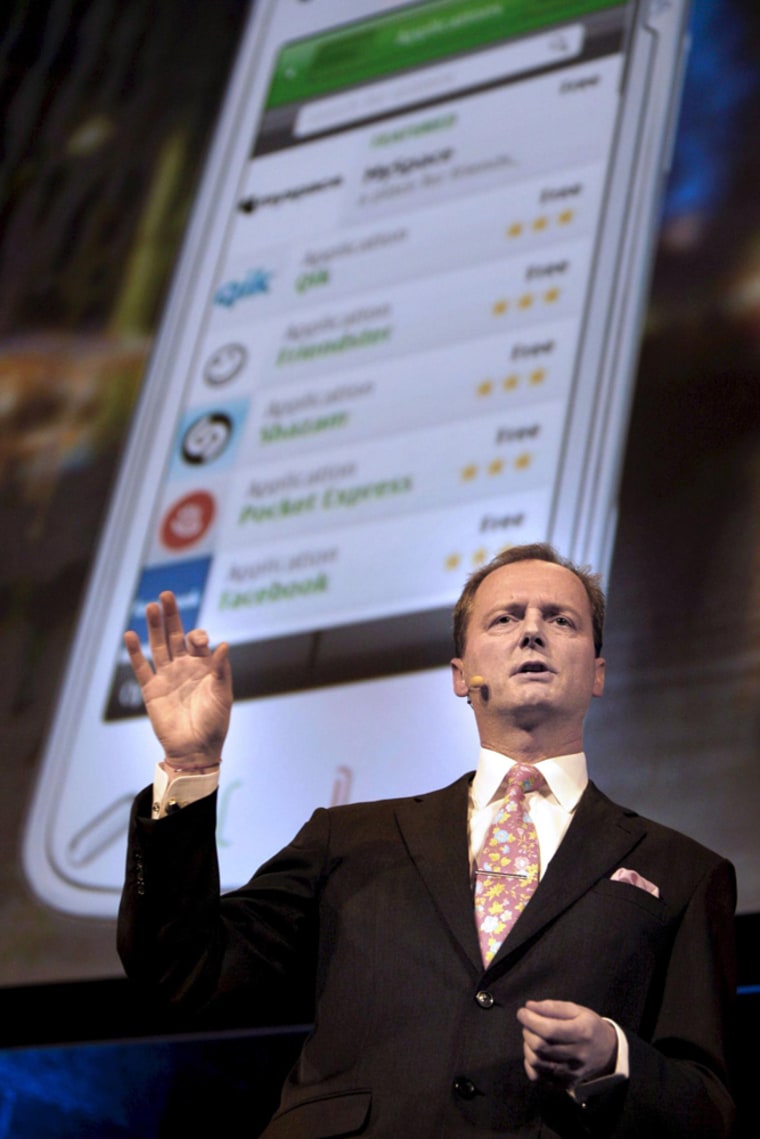The softness in the market for new mobile phones showed clearly Monday in a thin array of new product rollouts at the GSMA Mobile World Congress trade show in Barcelona — usually a smorgasbord of eye-catching gadgets.
With the global recession making companies hold back, big device launches were thin on the ground, and anyone wanting a flurry of new products using the Android operating system developed by Google will have to wait.
"They are very conscious about the market this year. All of them they are expecting a market slowdown so there is no point to launching high-end devices and drop it after a quarter or two," said IDC market researcher Francisco Jeronimo.
Sony Ericsson announced its first full touchscreen phone with 12 megapixel camera running Symbian Foundation S60 software — the first non-Nokia phone to launch with the platform. The phone, called the idou during the development stage, will be launched in the coming months with a commercial name and brought to market in the second half of this year.
Sony Ericsson also announced the W995, a new Walkman phone, that is the first to offer all of its photographic and entertainment features in one phone as it seeks to enhance its brand and secure its position in the search for new revenue.
"We've had a downturn in the economic confidence of consumers, and the mobile industry also has been hurt. In that atmosphere, Sony Ericsson is trying to find its way," Lennard Hoornik, head of marketing, told a presentation Sunday.
The company was not yet prepared to announce any models with the Android operating system developed by Google, executive Steve Walker said.
Samsung also renewed its pledge to come out with an Android, but wasn't ready to preview a model.
The entire conference itself was less electrifying than in past years. Slightly fewer industry officials registered — 49,000, down from 55,000 last year — probably reflecting cost-cutting measures back at headquarters.
The only Android announcement came from the Chinese manufacturer Huawei Technologies Co Ltd, which intends to release a "white label" — meaning it uses an operator's brand name — Android phone later this year, but it wasn't yet saying with which operators and in which geographical regions.
Microsoft, on the other hand, got a big deal with LG to raise by tenfold the number of handsets that will carry Microsoft's new operating system in 2009. (Msnbc.com is a joint Microsoft - NBC Universal venture.)
Though the handset market is softening, the mobile phone industry as a whole more resilient to the economic downturn than most, and could be one of the stimuli to help the world recover, a panel of industry experts said at a gathering of industry officials that opened Monday.
That view seemed to get a boost by a new survey by the GSMA wireless industry association showing that consumers intend to dramatically ramp up their use of data services — those delivered by smart phones, and an important revenue source for telecoms operators — over the next two years.
The survey conducted by Tellabs showed that 71 percent of consumers expect to use data services like mobile internet during the next two years, though they remain concerned about the cost, speed and quality of service. The survey was conducted by the Nielsen Company in five Western European markets and the United States.
"The mobile industry is one of the few sectors not asking for a bailout," GSMA chairman Rob Conway. "In fact, it is in one of the best positions to weather the downturn."
But Conway and other executives voiced concern that a lack of clarity in the regulatory environment and uncertainty about how new spectrum will be allocated around the world could hinder the wireless sector from making investments that could stimulate the greater economy.
Economist Jeffrey Sachs, who looks for economic solutions to help the world's poor, said critical telecoms investment in the developing world — a proven catalyst to economic growth — was likely to continue even at a moment when foreign investment is plummeting in general.
"The technologies that are embodied by this sector, beyond mobile telephony and mobile broadband, are not only a source of profitable investment but a source of massive productivity gains and massive inclusion of different parts of the world that lead directly to their economic empowerment," Sachs said. "This is true from the poorest villages in the world to the largest emerging market."
